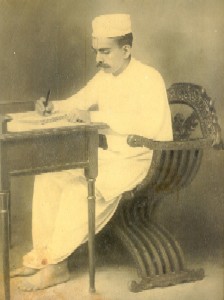
|
|
Seth
Govinddas on his |


|
|
Seth
Govinddas on his |
It
was the contemporary wave of national movement, which captivated the heart of
young Govind Das at the of just 24 years and led him to join National Congress
party in the year 1920. It was a period during which there was great unrest and
anguish among the people of the nation due to the Jalliawala Bagh incident which
saw the death of hundreds of innocent Indian lives at the hands of the British.
It was the platform, which laid the foundation for the Non-Corporation Movement.
People were geared up to fight the British Oppressors.
The
work pertaining to Non-Corporation Movement began in the Central Province with
the visit of Mahatma Gandhi to Jubbulpore. Gandhiji stayed at the house of
Shayam Sunder Bharagava at Bada Bazaar, since he wanted to come in contact with
the maximum number of people. To get a glimpse of the Mahatma was like a feast
for the people of Jubbulpore. All gathered to hear the Mahatma and donated
jewellery and other valuables for the Swaraj Fund. He collected a total of Rs.
20,000. But went back with a heavy heart, as people could not hear him due to
lack of loudspeakers in the city.
A
decision was taken by the National Congress Party committee to form a Satyagrah
Inquiry Committee. The objective of the committee was to carry out a survey
across the nation to ascertain if the country was ready for a Satyagraha
movement. The committee comprised of 6 members viz. Motilal Nehru, Dr. Ansari,
Vitthalbhai Patel, Rajgopalacharya, Kasturi Ranga Ayangar and Hakim Ajmal Khan
(Chairman).
The
questionaire prepared by the committee was forwarded to all Congress committees
and answers were demanded. This was followed by tours of all regions and
interaction with the party workers.
For
the committees visit to Jabalpur, Seth Govind das ji decided that arrangements
for the boarding of the members would be done at Govind Bhavan, his townhouse in
the Civil Lines area of Jabalpur, during their stay in the city.
But
this raised problems for Diwan Bahadur Jeevan Das ji as he had friendly
relations with the British Government. Sir Frank Sly, who was then the Governor
of Central Province, called Jeevan Das ji and expressed his concern at an
anti-British government committee staying at his townhouse. Jeevan Das ji
tactfully handled the situation by explaining, ‘Well Sir, Govind Das has as
much right upon Govind Bhavan as I do. Therefore, its beyond question on my part
to prevent any of his guests from staying at Govind Bhavan.’ But Sir Sly was
not an easy person to give up. He said, ‘it seems that both father and son are
playing games with the government. One is with while other is against. This
would not be tolerated.’ He then gave Jeevan Das an ultimatum that either you
disown your son or you leave the side of British. Both the options were
difficult for Jeevan Das ji, on the
one hand he was as loyal to the British as before and his business interests
linked to them and on the other Govinddas ji was his only son. So, Jeevan Das ji
wrote a letter to the higher British authorities criticising the whole
interaction with Sir Sly and so the incident was taken care off.
The
committee came to Jubbulpore and the members stayed at Govind Bhavan. People
come in long queues to give in their statement. Many public programmes were
organised during their stay. An interesting incident took place when Jubbulpore
Municipality gave a letter of appreciation to Hakimji, the Chairman of the
committee. A tri-colour flag was hoisted on this occasion at the Town hall,
which a government building. The matter caught such prominence and notice that
it was a subject of debate in the House of Commons in England. The British
Government of India was thereafter asked to bear in mind that such incidents are
not repeated in future.
The
report of the Satyagrah Inquiry Committee made it clear that the country was not
ready for a combined Satyagrah, but it recommended that Regional committees
would have the right to carry out Satyagarh on their own.
During
this period a rift developed between the senior members of the congress party
and this deepened during the Gaya Session of the Party. As a result, Deshbandhu,
who was the President, resigned from the party. Futile efforts at reconciliation
were made by Jawaharlal Nehru and Maulana Aazad.. Ultimately the rift resulted
in the formation of a new party - the
‘Swaraj Party’. Deshbandu Das was elected as President, Motilal
Nehru-General Secretary and Govind Das ji was made the treasurer of this new
party.
The
school headed by Motilal Nehru advocated a new line of political activity under
the changed conditions. They said that nationalists should end the boycott of
the Legislative Councils, enter them, obstruct their working according to the
official plans, expose their weakness, and transform them into arenas of
political struggle. Sadar Vallabhbhai Patel, Dr. Ansari, Babu Rajendra Prasad
and others known as ‘no-changers’ opposed Council entry.
A
special conference of the Congress party was convened at Delhi, which was
presided over by Maulana Abdul Kalam Azad, to reconcile the differences between
various factions of the party. A settlement was reached which allowed
independence to the different groups to carry on their work in their own way.
Those who wanted to stand for the council election could do so while those who
were criticising, were asked to stop doing so, if they could not openly support
it.
Significant events of 1924 and 1925
Recommendation for the high profile post for Govind Das ji and his refusal